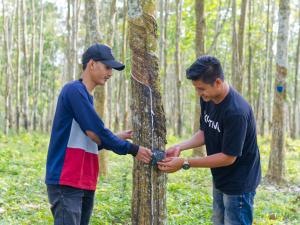Southeast Asia leads natural rubber production but faces EUDR challenges. Koltiva empowers smallholders with traceability and training for compliance.
Koltiva is deeply committed to supporting Southeast Asia’s industry in meeting the EUDR requirements”
— Manfred Borer, CEO and Co-Founder at Koltiva
BERLIN, GERMANY, December 27, 2024 /EINPresswire.com/ -- The EU Deforestation Regulation (EUDR) presents a significant challenge for Southeast Asia’s rubber industry, which accounts for 80% of global natural rubber production. Thailand, Indonesia, Vietnam, and Malaysia lead in production, with Thailand exporting an impressive 4 million tons annually (35% of global output) and Indonesia following with 2.5 million tons. These figures represent a
powerhouse industry driving export values of $19.7 billion in Thailand and $5.6 billion in Indonesia, firmly rooting rubber as a critical player in their economies and the global market (ARC, 2022).Smallholders face unique hurdles in adapting to the stringent traceability and sustainability requirements mandated by the regulation. According to Regulation (EU) 2023/1115, commodities entering the European Union must be deforestation-free and accompanied by comprehensive due diligence documentation (EU, 2023). However, compliance remains a formidable task for smallholders due to fragmented supply chains, limited infrastructure, and challenges such as land legality and mixed-origin rubber.
In response, Koltiva, a leading agritech company for enterprises to make global supply chains traceable, inclusive, and climate-smart, has introduced tailored solutions that empower smallholder producers to overcome these challenges while maintaining their livelihoods and market access.
“Koltiva is deeply committed to supporting Southeast Asia’s industry in meeting the EUDR requirements,” said Manfred Borer, CEO & Co-Founder at Koltiva. “Our tailored solutions are bridging the gap between regulatory demands and smallholder capabilities, ensuring compliance, sustainable growth and market resilience.”
Koltiva provides comprehensive support to help smallholders comply with EUDR regulations. From supply chain mapping and land documentation to training and traceability through its (traceability platform) KoltiTrace and (producers’ training coaching) KoltiSkills solutions, Koltiva ensures smallholders meet standards and maintain access to global markets.
Boots-on-the-Ground Expertise in KoltiSkills
To support smallholder producers meeting the complex requirements of the EUDR, KoltiSkills offers a range of specialized services to build capacity and ensure compliance. For instance, KoltiSkills has already coached approximately 6,000 Rubber producers, equipping them with the knowledge, skills, and tools needed to navigate regulatory challenges effectively. In addition, Koltiva has already mapped and registered more than 180,000 producers and verified more than 790,000 Ha of farm plots and production areas in Southeast Asia, mainly in Thailand, Vietnam, Malaysia, and Indonesia.
The field agents work closely with producers and suppliers to accurately map smallholders within the supply chain. This involves in-depth data gathering and risk assessments for each smallholder to ensure compliance with EUDR traceability requirements. Through its KoltiTrace platform, it documents the supply chain pathways, and identifies deforestation-related risks and compliance gaps. For precise traceability, KoltiSkills assists local operators in recording, monitoring, and verifying the journey of their products from seed to table. Through digitalization, KoltiSkills enables smallholders to maintain accurate records, ensuring product segregation and quality control across the supply chain. This tailored traceability solution supports EUDR compliance by helping smallholders track each step of production and avoid deforestation-linked risks.
The company provides tailored training sessions through field agents which raise awareness of sustainable practices and the importance of compliance. These sessions focus on empowering smallholders with the knowledge and skills needed to meet EUDR standards.
Southeast Asia’s Compliance Challenges and Opportunities
Smallholders in Southeast Asia face significant hurdles in meeting EUDR requirements, including limited formal land documentation, fragmented traceability systems, and lack of geolocation compliance. For instance, in Indonesia, only 10,000 hectares of 3.2 million smallholder plantations have Plantation Cultivation Permits (STDB), risking a $527 million export loss (Asia News, 2024). Vietnam and Cambodia also struggle with mixed-origin rubber, complicating cross-border traceability (Lesprom, 2023).
Koltiva addresses these gaps by helping smallholders obtain essential legal documents and certifications, such as Rainforest Alliance and FairTrade, while working with local governments to improve compliance. Thailand, leading the region with 95% producer registration on a national traceability platform, highlights the potential of centralized digital solutions. Koltiva aims to replicate this success across Indonesia, Vietnam, Malaysia, and Cambodia, empowering smallholders to meet standards and access global markets.
“With Koltiva’s solutions, we empower smallholders to thrive under EUDR regulations and drive a sustainable global supply chain,” said Borer.
By leveraging digital tools and capacity-building programs, Southeast Asia’s rubber industry can secure market access, champion sustainability, and set a global standard for balancing environmental responsibility with economic growth.


No comments:
Post a Comment